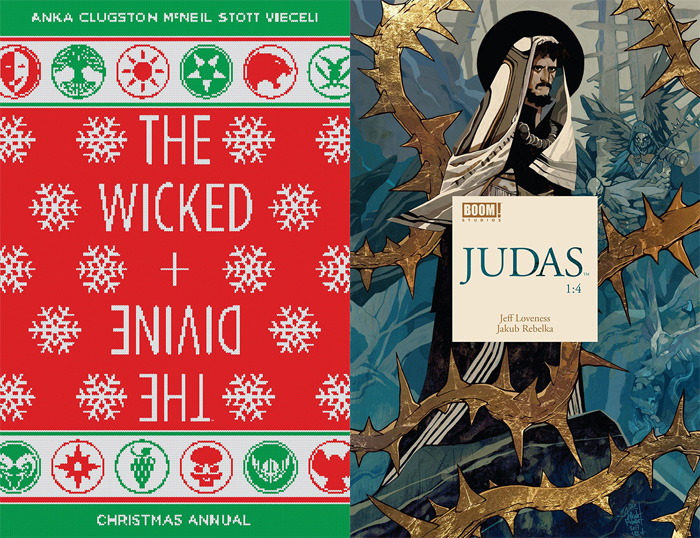Kayleigh Hearn is reading…
The Wicked + The Divine Christmas Annual
Written by Kieron Gillen
Art by Kris Anka & Jen Bartel, Rachel Stott, Chyna Clugston Flores, Emma Vieceli, Carla Speed McNeil
Flats by Dee Cunniffe, Ludwig Olimba, Brandon Daniels, Fernando Arguello
Colored by Matt Wilson, Tamra Bonvillain
Lettered by Clayton Cowles
“I’m sorry.”
Despite the title and the ugly sweater-ified cover, The Wicked + The Divine Christmas Annual is not Christmas themed at all, so how the latest incarnations of Lucifer and a feline war goddess spend the holidays will have to stay in the realm of headcanons and fanfiction, for now. Instead, it features several vignettes drawn by multiple guest artists that fill in important blanks in the overarching story, as well as provide fan service. Lots of fan service. “Misato cooing at the end of every episode of Evangelion” fan service. For fans that were disappointed that an important relationship between two men of color happened entirely off the page, Kris Anka and Jen Bartel gracefully illustrate the first time Baal and Inanna slept together, and it’s one of the sweetest, most sensual love scenes I’ve read in some time. Chyna Clugston Flores draws a punny funny chance encounter between Dionysus and Baphomet before they became gods, and Carla Speed McNeil’s portrayal of little Amaterasu’s weeaboo fanart of the gods is friggin’ priceless.
But this wouldn’t be WicDiv without an air of melancholy hanging over even the funniest, naughtiest bits—you can feel the jab of Kieron Gillen twisting the knife as you read about these characters in happier times, when many of their heads were still attached to their bodies. (And after last issue’s “forget everything you thought you knew” cliffhanger, this is Gillen at his jabbiest.) The nonlinear storytelling makes the issue feel a bit disjointed; Emma Vieceli draws a Tara story that feels like it was cut from another issue’s script, for example. At the same time, however, there’s a feeling that we’re reading a comic by a storyteller who has become much, much more confident in the years since the first issue of WicDiv was published—look no further than Rachel Stott’s flashback to Laura visiting Lucifer in prison, where the subtext finally becomes text and they admit their mutual attraction. (This was my “Ray Holt screaming ‘VINDICATION!'” moment.) Does this read exactly like one of those shippy, between-the-scenes fanfics you used to ravenously read on Archive of Our Own? Absolutely. But that’s not a dig, since fandom—how we participate in it, or consume it—is a big part of the series. Hey, it’s been a hard year, whether you’re a character in the story or only the person reading it, so let’s enjoy all the fun, fucking, and fandom while we have it.
David Lebovitz is reading…
Judas #1
Written by Jeff Loveness
Art by Jakub Rebelka
Lettered by Colin Pell
Boom! Studios
“I believed you could change. But you chose not to. You chose to be this. And it wasn’t enough.”
If you think there’s going to be any jokes about me being so disappointed in this comic I felt betrayed by it, you’ll be disappointed. Partly because that’s beneath me, partly because we already have a pun-loving David on staff who isn’t me, and partially because I… uh… didn’t want to put the effort into making it work. Judas #1 doesn’t inspire me enough to make an effort. Whatever this comic wants to be, it’s off to a bad start. Nothing happens and I’m not interested in what comes next.
Judas is, ostensibly, about what became of Judas Iscariot in hell after betraying Jesus. (Skipping over the part where Judas bought a field and crapped himself to death in it. No, really. Acts 1:18-19) The vast majority of the comic just retells the story of Judas and what led him to betray Jesus. There’s a tiny bit of insight provided—specifically Judas’s doubts about Jesus, and wanting Jesus to be more—but it’s just a rapid retelling of the gospel. The drama of this story is going to be Judas’s time in hell, as judged by the last few pages, but we’re shown so little about it that I’m not that interested in learning more. One of the only things that stands out is that there’s precious little in the way of actual religion mentioned—it’s less about Jesus’s miracles and more about how one of his apostles saw him as a person. That’s about as novel as it gets.
The art is decent and the coloring works, but it’s not good enough to carry the story in lieu of the lack of text. Whenever Jesus speaks, the lettering is in red; it’s possible this relates to red letter bibles, but more than anything it feels like a cheap attempt to imitate Preacher. This is driven home by the fact that Judas is outright advertised for fans of that very same beloved Vertigo series.
There’s not much to say about this comic because it doesn’t say much of anything. It’s simple, treads no new ground, feels like it’s ripping off Preacher in the most pathetic way, and gives me no reason to care about what comes next. If you’re looking for a postscript to a story where the main character is betrayed, save your money and use it to get a ticket to The Disaster Artist.
Thanks for reading about what we’re reading! We’ll be back next week with a slew of suggestions from across the comics spectrum. In the meantime, what are you reading? Tell us in the comments section, on Twitter or on our Facebook Page!


